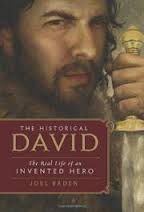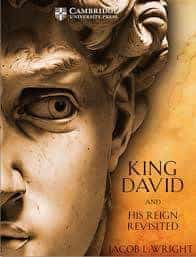 I’m reading together two recent books that explore the live of King David: Joel Baden’s The Historical David: The Real Life of an Invented Hero
I’m reading together two recent books that explore the live of King David: Joel Baden’s The Historical David: The Real Life of an Invented Hero and Jacob L. Wright’s King David and His Reign Revisited. The latter is available now in iBooks and will soon be available from Cambridge University Press.
Neither book is for raw beginners, meaning those who are not used to thinking of biblical figures within the parameters of historical critical scholarship. But neither are these books academic tomes that overwhelm you with information and technical jargon.
They are, rather, accessible and informative overviews of David as a historical figure, written by highly competent and respected scholars, that synthesize major currents in biblical scholarship for, let’s call it, the motivated non-expert.
Wright’s book, being an iBook, is also interactive, with many wonderful visuals. Footnotes are accessed by clicking 4 icons that correspond to 4 different types of categories: scholarly notes, biblical citations (and other ancient sources), movie links, and maps. And, and unlike e-books, this one has a fixed-page format–not that annoying “location” format.
are accessed by clicking 4 icons that correspond to 4 different types of categories: scholarly notes, biblical citations (and other ancient sources), movie links, and maps. And, and unlike e-books, this one has a fixed-page format–not that annoying “location” format.
Despite these differences in formatting and the distinct manner in which each author presents his case, the general picture of David they both present is that of a politically savvy tribal chieftain who ascends the throne of Israel by means most today would not want their leaders–or children (think Vacation Bible School)–to emulate.
The positive biblical depiction of David, the authors tell us, is propagandistic, though at the same time leaving one enough clues (inconsistencies) for careful readers to discern that the David behind the text bears only minimal resemblance to the David of the text.
Those who are already familiar with the scholarship on the historical David will benefit from each author’s distinctive reconstruction. Those wanting to enter that scholarly conversation will no doubt benefit from both books, as they are more than simply reconstructions of David. They are also case studies in critical methodology–archaeology, history, and literary source analysis–albeit modified for broader readership. Wright’s book, because of its footnote system, is able to offer readers a bit more scholarly information without overwhelming readers.
The broader importance of the search for the historical David goes well beyond the question of David himself. It touches upon the very origins of Israel as an independent kingdom, e.g., was there ever a united monarchy, how did kingship develop in ancient Israel, and to what extent are Israel’s own stories about its origins (essentially the stories of Abraham though the Judges) are legitimate (if also hazy) historical sources?
And as both books make clear, this issue is not simply a matter of whether or not one wishes to “trust” the Bible, but how one reads the complex and conflicting information we find there.
If what I just said jazzes you, you’ll probably enjoy reading both these books quite a bit.
